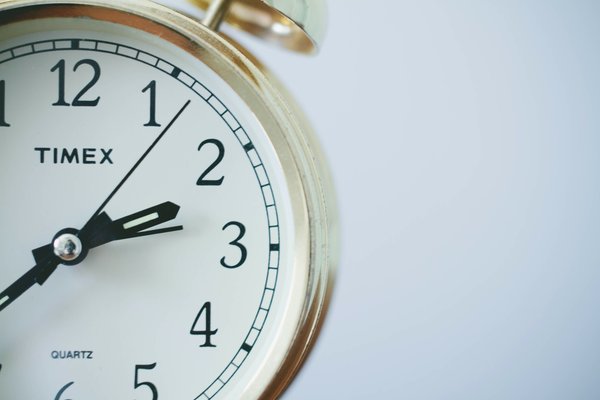Collective groans emerge from under comforters each spring with the advent of daylight saving time and the loss of one hour's sleep.
A recent poll conducted by Monmouth University found that 61% of Americans wanted to get rid of the twice-a-year time change – falling back an hour each November to standard time and springing ahead each March to daylight saving. Just over one-third of people wanted to keep the back-and-forth shifts.
MORE: Drinking coffee could lower risk of obesity, study says
Not only is switching from standard time to daylight saving the second Sunday in March wildly unpopular – it is also dangerous. Studies have shown it leads to increased behavioral health issues, cardiovascular events and traffic fatalities.
"That one-hour change may not seem like much, but it can wreak havoc on people's mental and physical well-being in the short term," Dr. Charles Czeisler, a professor of sleep medicine at Harvard Medical School, told Harvard Men's Health Watch last year.
Pushing clocks ahead an hour increases "our exposure to morning darkness and to artificial light at night," which disrupts our circadian rhythm, the name for the physical, mental and behavioral changes we experience over a 24-hour period, said Dr. Zhikui Wei, a specialist in sleep medicine and neurology at Thomas Jefferson University's Sleep Disorders Center. It may take "weeks to months to adjust to the lost hour" resulting in "ongoing sleep deficiency."
The negative health impacts from this disruption range from mood changes to increased risk for suicide and substance abuse.
"It's definitely not uncommon for patients who struggle with circadian rhythm disorders to struggle with mental health disorders such as depression and anxiety," Wei said.
People are at higher risk for heart attacks, strokes and traffic accidents in the days following the move to daylight saving time.
Behavioral, learning and attention issues are also common among adolescents who get less sleep. A 2015 study found that students had slower reaction times and were less able to pay attention in school in the days following the spring time change.
These findings are why the "medical community in general has voiced support for permanent standard time," Wei said.
In 2020, the American Academy of Sleep Medicine published a position paper against the move from standard time to daylight saving time, stating that the "acute transition" leads to serious public health and safety risks.
"Daylight saving time is less aligned with human circadian biology – which, due to the impacts of the delayed natural light/dark cycle on human activity, could result in circadian misalignment, which has been associated in some studies with increased cardiovascular disease risk, metabolic syndrome and other health risks," the paper reads, ultimately advocating for the move to a fixed, year-round standard time.
Legislation to eliminate the back-and-forth time changes has been languishing in Congress.
Last year, Sen. Marco Rubio, of Florida, reintroduced the bipartisan Sunshine Protection Act in the U.S. Senate. It would create a permanent, national daylight saving time. But the bill, which would generally mean less light in the morning, has stalled.
At this time, federal law still prohibits states from adopting permanent daylight saving time.
Plus, medical experts do not support permanent daylight saving since it causes a "misalignment between social clock and internal circadian rhythm," Wei said.
"Many people's circadian rhythms are somewhat resilient, but if you're going to make a change, it would be much more favorable to go with standard time," Dr. Patrick J. Strollo Jr., a sleep-apnea researcher and pulmonologist at the University of Pittsburgh, said in a post on the American Medical Association's website.
When the United States experimented with universal daylight saving time in 1973, during an energy crisis, the sun generally didn't come up before 8 a.m. across Pennsylvania. Parents objected to their children riding buses back and forth to school in the dark.
The shift to universal daylight saving was so unpopular that Congress halted the plan just 10 months into the experiment.
The tug-of-war time changes began in the early 1900s to preserve energy and resources and to promote commerce. The shifting between standard and daylight saving time started and stopped several times before becoming permanent with the 1966 Uniform Time Act.
What makes these biannual time changes especially unhealthy is that they exacerbate existing problems people have with sleep hygiene, Wei said.
"One of the biggest challenges in modern day is that sometimes there are other priorities that may take the place of sleep," Wei said. "But from a health perspective and a life perspective, sleep is an essential function."
Daylight saving time takes effect Sunday at 2 a.m., when clocks move one hour ahead.
To help ease the transition, Wei recommended that people start waking up 15 to 30 minutes earlier each day, starting Thursday. "That way, people may have an easier time adjusting to the earlier schedule," Wei said.
He also suggested that people prioritize and protect their sleep even more than they normally do by:
• Maintaining a consistent sleep schedule
• Getting 7-9 hours of sleep a night
• Avoiding caffeine, alcohol and smoking
• Reducing exposure to artificial light, such as from electronic devices, at least 30 minutes to one hour before bedtime
• Seeking professional help for any mental health issues, such as anxiety and depression
How do you know if you need to see a sleep specialist?
If you have trouble falling asleep, staying asleep or experience unsatisfying sleep, you might want to talk to a medical provider, Wei said.
Other reasons to think about having a sleep assessment include experiencing mood swings or mood disturbances during the day or suffering from impaired daytime functioning and alertness.


